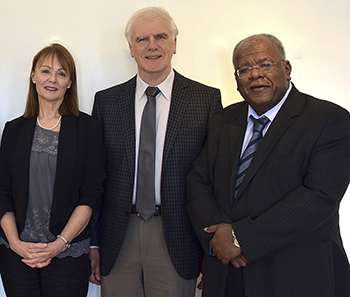
Prof Jonathan Jansen, senior researcher at the UFS
Faculty of Education, recently joined two other
UFS researchers as NRF A-rated researchers.
They from the left are: Profs Melanie Walker, Maxim Finkelstein
and Jansen.
Photo: Charl Devenish
The University of the Free State received its third A-rating from the National Research Foundation (NRF) when Prof Jonathan Jansen was awarded an A2-rating.
Prof Jansen is a Senior Research Professor in Education secondary research field and field of specialisation: Development education and Curriculum theory at the UFS Faculty of Education and Fellow at the Center for Advanced Studies at Stanford University in the US.
Prof Jansen’s rating follows P-rating
Prof Jansen’s rating also adds to the recent P-rating awarded to Dr Daniel Spence, a postdoctoral Research Fellow at the International Studies Group. In receiving the rating, the UFS became the only university in South Africa with a P-rated researcher in History.
P-ratings are given to young researchers, usually under the age of 35, who have the potential to become leaders in their field. Researchers in this group are recognised by all, or the overwhelming majority of, reviewers, as having demonstrated the potential to become future international leaders.
“Obtaining another A-rating is indicative of the university’s drive to enhance its research profile – nationally as well as internationally. I am thankful to our scholars for their commitment to the rating process and look forward to receive the results of this year’s ratings,” said Prof Corli Witthuhn, Vice-Rector: Research at the UFS.
Total number of researchers increased
The UFS has also upped the ante with regards to its total number of NRF-rated researchers during the latest rating and evaluation with an increase from 127 in 2015 to 149 rated researchers in 2016.
In 2015, Prof Maxim Finkelstein from the Department of Mathematical Statistics and Actuarial Science, and Prof Melanie Walker, Senior Research Professor and Director of the Centre for Research on Higher Education and Development, were given A-ratings.
Prof Finkelstein’s rating then made him the only A-rated researcher in ‘Probability and Statistics’ regarding Mathematical Sciences in the country. Prof Walker was evaluated and graded in the division for Research, Innovation Support and Advancement.
According to the NRF, A-rated researchers are “unequivocally recognised by their peers as leading international scholars in their field for the high quality and impact of their recent research outputs”.
The rating of individuals is based primarily on the quality and impact of their research over the past eight years.